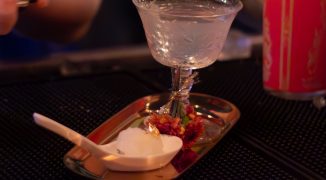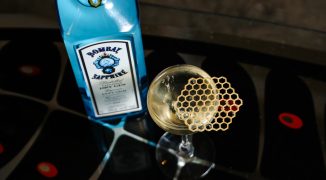Tight-knit bar communities are not always safe places for outsiders looking to stake their claim. This is particularly true in Chicago, a city built on the backs of the native bartenders who elevated it from plastic-cup-bound vodka-sodas to Old Fashioneds served in glass spheres. When Broken Shaker co-owners Gabe Orta and Elad Zvi chose downtown Chi-Town for the second Broken Shaker, the announcement was met with equal excitement and hesitation. How would the poolside Miami lounge translate to frigid Chicago?
The duo entered as admitted tourists, diving into Chicago’s network of diverse neighborhoods. They began their research by visiting a sushi spot, where they turned to the table next to them and asked where to find the best margarita. Once at the recommended bar, they inquired who baked the best bread in the city, and so on and so forth, until they’d acquired an intimate knowledge of local tastes.
This rabbit hole led them to develop globally inspired food and cocktail menus using local artisanal ingredients and distinctly Chicago flavors, like the charcuterie board loaded with meats from nearby West Loop Salumi, farm fresh cheeses and the aforementioned bread from Publican Quality Bread. Their journey also led them to less conventional discoveries such as chapulin herb salt and mole sauce in a nondescript West Side grocery. These exotic ingredients inspired drinks such as The Godmother (roasted corn reduction, sherry and mezcal) and Hecho en Mexico (Carlos’ mole elixir, Cocchi Americano, Ancho Reyes chili liqueur and mezcal).
“We wanted to create a Chicago story, we didn’t want to bring Miami to Chicago,” Zvi said. “There is so much diversity here and so many great products that are sometimes underutilized. We wanted to take them and create a unique experience.” One thing Zvi did want to bring from Miami was the “chill vibe,” achieved through mellow music and South Beach accents—a wood paneled bar, foliage-covered wallpaper and found treasures displayed on custom shelves.
Less than six months after Shaker’s Chicago opening, the city welcomed another lauded bar team. GreenRiver, the second stateside concept from partners Jack McGarry and Sean Muldoon of New York City’s The Dead Rabbit, is scheduled to open this month on the 18th floor of a Michigan Avenue-adjacent high-rise. Rather than looking at their adoptive city’s present, McGarry and Muldoon, along with new partner on this project Danny Meyer, took cues from its past. Specifically, Chicago’s rebirth after the Great Fire of 1871, which was led by Irish-American artists, inventors, gangsters, politicians and developers.
This isn’t the first time Irish history comes to life in a cocktail bar. Fans of The Dead Rabbit know the two-story pub and lounge channels New York in the late 1800s, an era marked by a wave of Irish immigrants landing in the city as respite from the Irish Potato Famine. “We wanted to reinvent what an Irish bar was, because over in America, Irish bars have this reputation synonymous with poor service, inferior quality and that type of stuff, so we really wanted to bring the world-class hospitality of Irish pubs and that’s what we did with Dead Rabbit,” McGarry said. GreenRiver will further illustrate this idea and “challenge the status quo of Irish pubs” with a more contemporary aesthetic.
Despite being Irish in theme, the cocktail menus are distinctly tailored to urban American cocktail culture. In preparation for GreenRiver, the team drank in high-end cocktails bars such as The Aviary as well as low-brow dives, until they settled on an “unpretentious” menu broken down by raw materials used for distilling spirits—rye, corn, barley, agave, wheat and oat, sugarcane and molasses, grape and apple, and juniper. The menu will be whiskey-heavy, because during his research McGarry found that was Chicagoans’ spirit of choice post-Prohibition.
When it comes to actually running multiple locations, these owners can takes cues from Erick Castro, who has been successfully operating bars on opposite ends of the country for the past year. “The only way I would recommend for someone else to do it is if you have very tight systems of communication,” said Castro, who oversees Polite Provisions in San Diego and Boilermaker in the East Village. “We have intense manager notes and systems of reporting. I feel like I am pretty much there, because technology allows me to do that. If you’re team isn’t savvy on that, then I say don’t even try it.”
There are rewards for those who can manage life split between multiple locations. Castro says the menu at Polite is more seasonally focused than when the bar opened in 2013, citing the distinct shifts in New York weather that lead to shifts in appetite. For example, a cinnamon and toasted almond cocktail originally destined for the summer menu will not be served until fall. Meanwhile, the East Coast benefits from the West’s proclivity for fresh, local ingredients via drinks such as the Oceanside (London dry gin, fresh lime, mint, sea salt and celery bitters).
Although one serves boozy sodas in a sun-soaked parlor and the other shots and beers in a dark dive, both are designed to satisfy locals with “cocktails for everyday,” an admirable objective for any watering hole—regardless of where the owner calls home.




